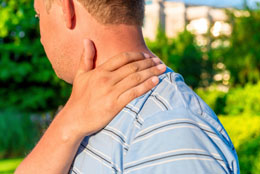Neck pain when accompanied by dizzy spells could be indicative of conditions such as vertigo, neck arthritis or cervical spondylosis. The following write-up will provide information on the contributory factors of neck pain and dizziness.

The term 'dizziness' is used to describe different sensations that are felt before a person feels that he/she is going to faint. The affected individual may feel lightheaded or may feel that everything around him/her is spinning. Loss of balance or the spinning sensation occur when your brain starts receiving conflicting messages from your inner ears. At times, dizzy spells may accompany neck pain. Neck pain may occur due to inflammation of the neck tissues, degenerative disc disease, neck strain or sprain, neck injury, a herniated disc, a pinched nerve, etc. Numbness, tingling, tenderness or dizziness are symptoms that may accompany neck pain. Here are some actual reasons that cause neck pain and dizzy spells in a person.
Common Causes
Cervical Vertigo
Cervical vertigo is one of the major causes for neck pain and dizziness, which usually gets provoked by a particular neck posture, irrespective of the orientation of the head with respect to the gravity, like turning of the head about the vertical axis while sitting upright. The pain is often caused by unnoticed minor injuries, a swollen gland or contraction of the vertebral arteries in the neck that route to the brain called neck proprioceptors. The neck, in such cases, is often positioned in a way that does not align with the eyes and ears in an organized manner, again, affecting blood supply and causing dizziness.
Neck Arthritis
Arteries, as we know, carry blood to the posterior part of the brain, transporting the blood in the vertebrae of the cervical spine. If a patient has severe neck arthritis along with osteophyte formation (bone appendages due to arthritis), these osteophytes can encroach on the space occupied by the blood vessels. This affects the blood supply to the posterior part of the brain and may result in severe neck pain along with dizziness, accompanied with a feeling of vertigo.
Benign Paroxysmal Positional Vertigo
It is a specific inner ear disorder that may occur due to small crystals floating in the fluid in the inner ear falling onto one of our balance sections. The patient may experience mild neck pain and short spells of dizziness that may begin suddenly and last for few seconds, especially when the patient is looking up at the sky or lying down in the bed. The disorder may also be caused due to a sudden blow to the head or from an age-related condition. However, this condition is harmless and may clear up without treatment in a few weeks. Consult a specialist/physiotherapist to ease the discomfort.
Neck or Whiplash Injuries
Neck or whiplash injuries or neck manipulations resulting from an accident or even during physiotherapy performed by some health professional can cause dizziness especially if you have an inner ear problem. However, this is not severe, but may continue for a long time.
Cervical Spondylosis
Lifting heavy objects on the shoulders for prolonged periods, dragging heavy objects, sitting in front of the computer for long hours, or sitting in an unhealthy fashion can cause tension in the neck muscles. Abnormal wear and tear of the discs and vertebrae in the neck region can give rise to cervical spondylosis. Pain in the neck, stiffness and numbness are some of the common symptoms. Though not very common , loss of balance may also be seen in affected individuals.
Other Reasons
- Vestibular nucleus is the part in a human's brain which induces dizziness in a person. Stress on the spine and the nape pressures this area disturbing the blood circulation which causes distress and eventually dizziness.
- Ear problems like tinnitus which is a ringing sensation in the ears is also a major factor. In these cases, an MRI scan should be done immediately to verify the complication.
- Wearing a neck strap to restrict motion and intake of OTC non steroidal anti-inflammatory drugs like naproxen, disprin and ibuprofen could contribute to pain in the neck coupled with dizziness.
Several studies reveal that nearly 75% patients have shown improvement of symptoms with conservative treatment, which include medications, physical therapy, gentle mobilization, exercise, correcting posture, etc. Do not dismiss this as a minor irritation, instead get it treated at the earliest.


 The term 'dizziness' is used to describe different sensations that are felt before a person feels that he/she is going to faint. The affected individual may feel lightheaded or may feel that everything around him/her is spinning. Loss of balance or the spinning sensation occur when your brain starts receiving conflicting messages from your inner ears. At times, dizzy spells may accompany neck pain. Neck pain may occur due to inflammation of the neck tissues, degenerative disc disease, neck strain or sprain, neck injury, a herniated disc, a pinched nerve, etc. Numbness, tingling, tenderness or dizziness are symptoms that may accompany neck pain. Here are some actual reasons that cause neck pain and dizzy spells in a person.
The term 'dizziness' is used to describe different sensations that are felt before a person feels that he/she is going to faint. The affected individual may feel lightheaded or may feel that everything around him/her is spinning. Loss of balance or the spinning sensation occur when your brain starts receiving conflicting messages from your inner ears. At times, dizzy spells may accompany neck pain. Neck pain may occur due to inflammation of the neck tissues, degenerative disc disease, neck strain or sprain, neck injury, a herniated disc, a pinched nerve, etc. Numbness, tingling, tenderness or dizziness are symptoms that may accompany neck pain. Here are some actual reasons that cause neck pain and dizzy spells in a person.